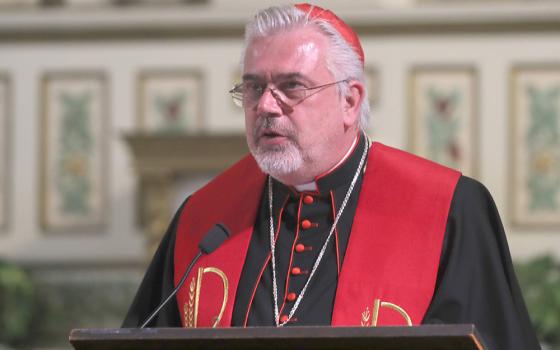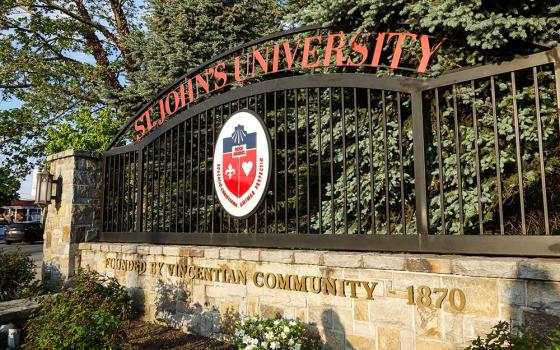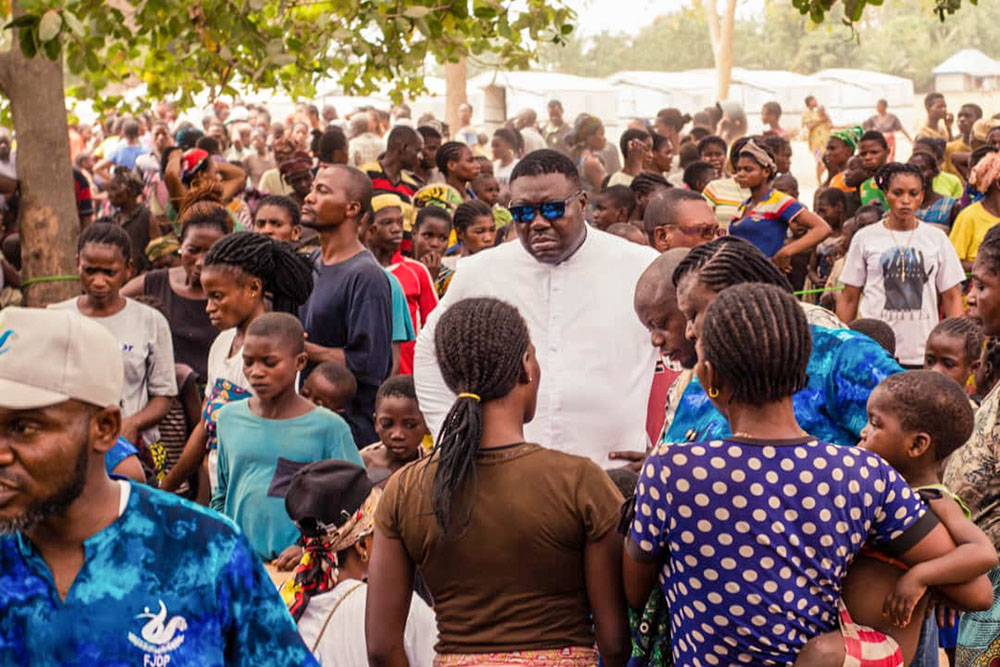
Fr. Remigius Ihyula accompanies internally displaced persons at the Uikpam camp in Benue State, Nigeria. Since 2017, Ihyula has responded to Benue's worsening humanitarian crisis, making the camps his second parish and offering pastoral care and counseling to traumatized survivors. (John Chukwu)
The sprawling camps for internally displaced persons in Benue State, Nigeria's North Central region, are steeped in grief. Mothers still writhe in the pain of watching their husbands and children butchered in the most inhuman form. Children wake in the night screaming, their dreams haunted by machetes. Men who lost their entire families sit in silence, heavy with sorrow and a sense of hopelessness. The bitter memory of their burned houses lingers in the air, serving as a reminder of homes reduced to ashes and young lives torn apart.
Fr. Remigius Ihyula moves amid the despair, his cassock brushing the dusty ground, his voice low yet steady with authority as he prays with a group of survivors who have lost everything.
Since 2017, Ihyula has been at the center of the Catholic Church's response to Benue's worsening humanitarian crisis. He has made the camps his second parish, offering pastoral care and counseling to traumatized survivors — mostly farmers displaced by brutal attacks from armed herdsmen, whom the survivors and locals in Benue widely identify as Fulani militias.
"If you see photos of people that were killed, you'll not sleep," the priest said. "Sometimes, the only thing you can do is cry with them [the survivors]."
He recalled that the Makurdi Diocese, in the Benue State capital, opened its first camp for displaced families as far back as 2001, with the support of Catholic Relief Services.
Ihyula is not alone in this mission. He relies on Sr. Mary Ojonugwa Unwuchola of the Missionary Sisters of the Holy Rosary in the Makurdi Diocese. She has devoted her life to internally displaced persons since 2021.
Unwuchola ensures that her comforting presence is felt in the camps and affected communities. The humanitarian crisis in the state gives her sleepless nights, turning her into a caregiver with many faces. She is either listening to survivors recount the horrific attacks they endured or offering words of reassurance, reminding them of God's abundant love. She also provides food and basic health care.
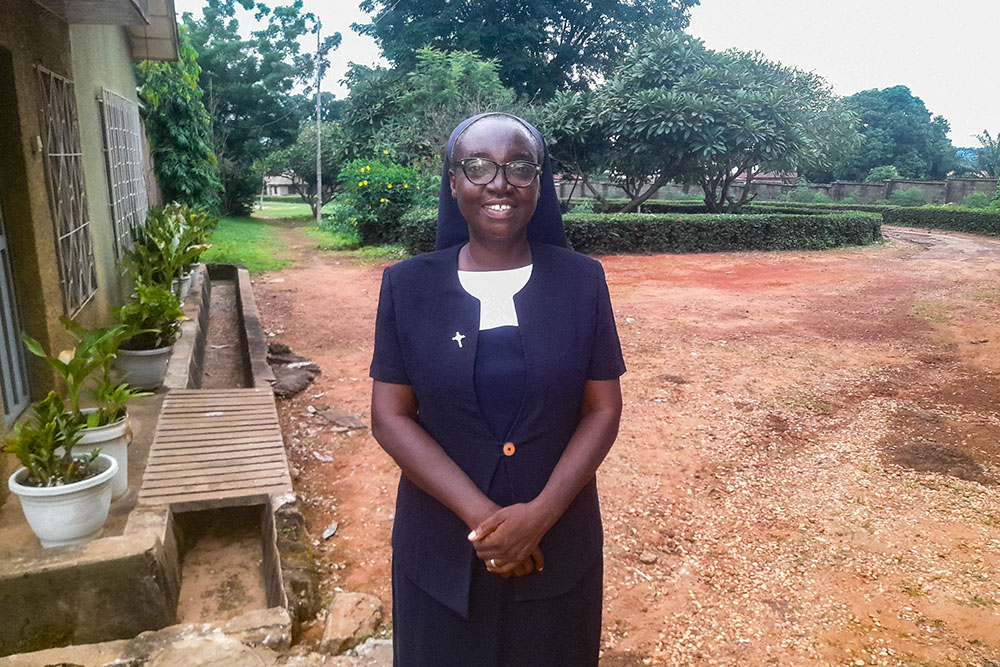
Sr. Mary Ojonugwa Unwuchola at the Missionary Sisters of the Holy Rosary Convent in Makurdi, Benue State, Nigeria. Unwuchola offers a comforting presence to those in the internally displaced persons camps and affected communities. (John Chukwu)
"In interacting with them, we console them. It is not easy to find them in that kind of state," she told Global Sisters Report. "We tell them not to give up on life."
Beyond food and health care, she encourages survivors to embrace prayer to help them cope with the trauma of killings, destruction and displacement.
"I make them understand that whatever they are going through, there are people, especially the church, looking out for them. This makes them not feel alone or abandoned in their suffering," she added.
For many survivors, Unwuchola's work symbolizes hope, a reminder that even amid loss, compassion can keep people anchored.
In Nigeria's North Central region, Benue has become the epicenter of the farmer-herder crisis, where farming communities have endured repeated waves of violence. Recurring attacks have been linked to unresolved boundary disputes, competition over land and natural resources, the movement of armed herders and militia groups, politics and cult clashes.
Some herders are reportedly armed, citing protection against cattle thieves, while farmers blame them for killings. The cycle of untrust has left many villages shattered.
Estimates of the number of deaths vary greatly, but Amnesty International counted a high death toll of 6,896 in Benue State between May 2023 and May 2025, with more than 450,000 displaced. The deadliest attack occurred on June 13, 2025, when assailants stormed the Yelwata community, killing as many as 200 people.
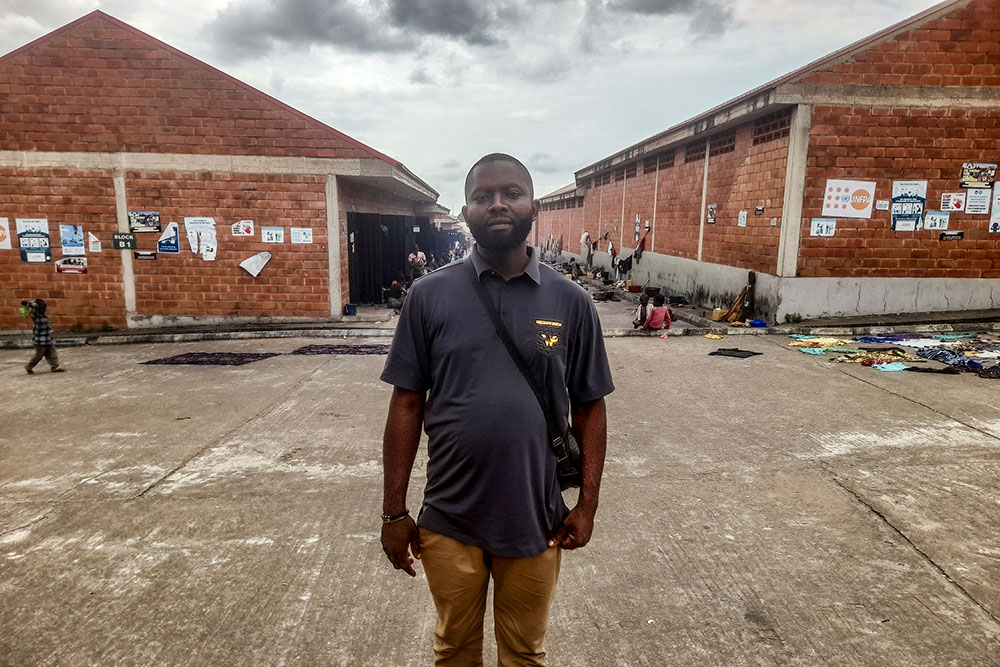
Azaaior Sunday at the International Market Camp in Makurdi, Benue State. He told Global Sisters Report that the church has tried to comfort him. "They hold church services on Sundays and during the week, taking people's minds away from the troubles." (John Chukwu)
Azaaior Sunday, a survivor of the Yelwata killings, told Global Sisters Report that many of his brothers were murdered. He said that before some residents managed to escape, several had already been killed and their bodies burned to ashes.
"Most of the people, they burned them inside their house. They injured many," he said with pain on his face. "One of my brothers, they killed his wife. Some people are still in the hospital."
The scale of the killings in Yelwata drew international attention. During a condolence visit, Nigerian President Bola Tinubu told security forces to end the carnage.
Unwuchola affirmed that some of the survivors are aggressive because of what they have gone through. "They are aggressive in the way they talk to each other. Some of them are desperate to have everything to themselves when something is being shared," she said.
"The Tiv people [the ethnic majority in Benue most affected by the crisis] are hardworking people. They are not beggars. But it is so unfortunate that this has happened," she said.
Unwuchola said she listens to their concerns, prays with them, offers encouragement and spends time with them, giving them hope for a better tomorrow.
Advertisement
"I offer them words of encouragement and assure them that God is still on the throne and will not abandon them," she said. "I also tell them to give themselves the room to have peace of mind and that God hears their prayer."
Ihyula coordinates the Makurdi Diocese's Foundation for Justice, Development and Peace, an initiative that has become a lifeline for thousands displaced by violence in the state. Through this platform, the church reaches out to the survivors, offering relief materials, pastoral support and a listening ear.
"I speak with them in such a way that they will always have hope, though I'm not a psychologist. My presence alone helps to comfort them," he said.
Unwuchola noted that some survivors are socially withdrawn and avoid talking to anyone, but with time, they start coming out of their shells.
Ihyula, however, said that the trauma sometimes worsens as a result of the degrading living conditions in the camps. "They live as if they are not human beings," he said.
Together, Unwuchola and Ihyula believe that faith, presence and even little acts of kindness can loosen the chains of despair, ease trauma and make way for healing.
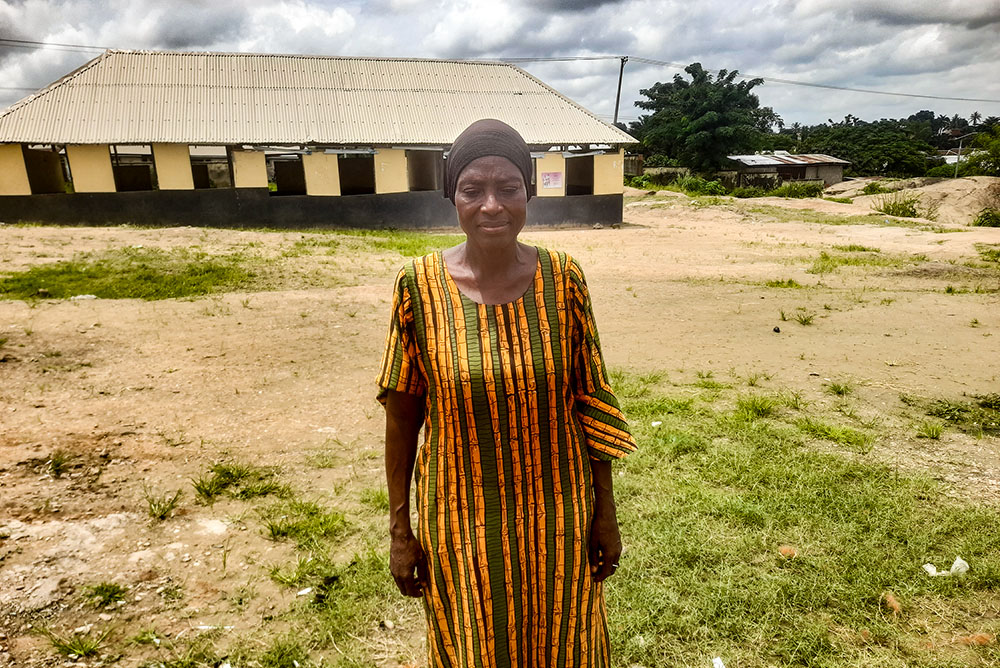
Mimidoo Kiva at the Ichwa camp in Makurdi, Benue State, Nigeria. Kiva said counseling and support from the priests and sisters have sustained her. "If not for God bringing them, I would have lost my mind," she said. (John Chukwu)
At the Ichwa camp, Mimidoo Kiva recalled how armed herders attacked them in their farm, killing her husband, sexually assaulting her and her daughter, who also died. "I don't like talking about my story. It makes me sick," she cried. "I was left with nothing."
Kiva said counseling and support from the priests and sisters have sustained her. "If not for God bringing them, I would have lost my mind," she said.
Terlumun Joseph Azongu, a resident of the Ichwa camp who lost his mother and friends in the attacks, said he fell into despair and reckless living. However, the efforts of the religious helped him "stop drinking and misbehaving."
Azaaior Sunday, who fled Yelwata to the International Market Camp in Makurdi, said every sound still startles him. He said that the church has tried to comfort him. "They hold church services on Sundays and during the week, taking people's minds away from the troubles."
Psychologist Elekwachi Chimezie told GSR that many survivors show signs of post-traumatic stress disorder. "When they enter environments that resemble past attacks, they get re-triggered," he explained, stressing the need for culturally rooted therapies and faith-based support.
Unwuchola admitted that caring for the survivors is her biggest challenge, and the magnitude of their needs far outweighs the limited government support. "Sometimes, I solicit help using my WhatsApp," she said. "I also write to some friends, and so far, God has been faithful in helping us."





